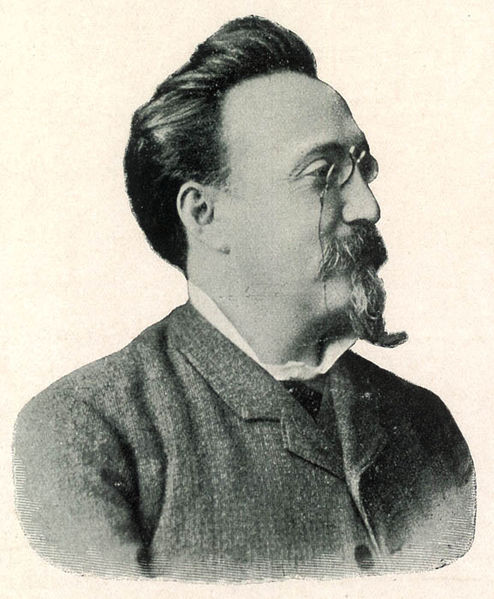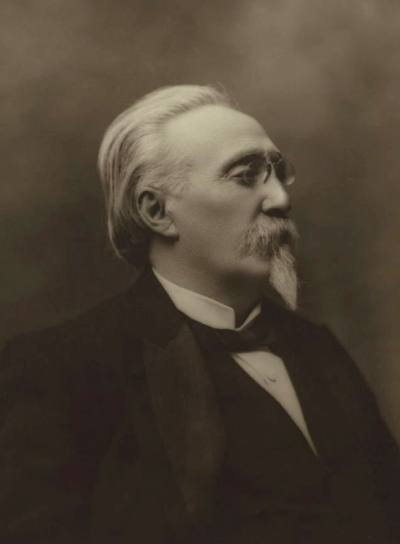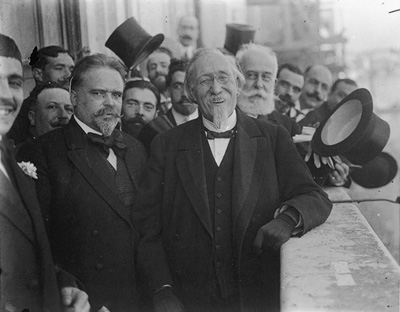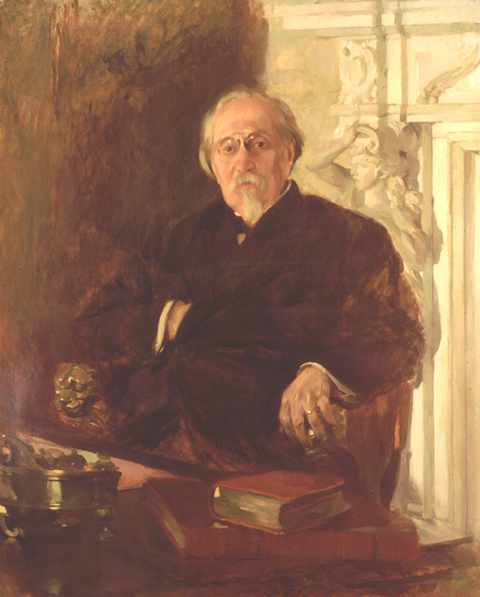<Back to Index>
- Aircraft Manufacturer Ferdinand Adolf Heinrich August Graf von Zeppelin, 1838
- Painter Pavel Dmitriyevich Korin, 1892
- 1st President of Portugal Manuel José de Arriaga Brum da Silveira e Peyrelongue, 1840
PAGE SPONSOR


Manuel José de Arriaga Brum da Silveira e Peyrelongue (Horta, July 8, 1840 - Santos-o-Velho, Lisbon, March 5, 1917) was a Portuguese lawyer, the first Attorney - General and the first elected President of the First Portuguese Republic, following the abdication of King Manuel II of Portugal and a Republican Provisional Government headed by Teófilo Braga (who would succeed him in the post following his resignation).
Of his early life details are brief: Arriaga was born to an aristocratic family; son of Sebastião José de Arriaga Brum da Silveira (c. 1810 - Setúbal, 18 October 1881) and wife (m. 24 December 1834) Maria Cristina Pardal Ramos Caldeira (c. 1815 - ?). Arriaga's father was a rich merchant in the city, only son, and property owner, whose heritage traced his lineage to the Flem Joss van Aard, one of the original settlers of the island of Faial (of the male line to a Basque family of small nobility) and whose second cousin was Bernardo de Sá Nogueira de Figueiredo, 1st Marquess of Sá da Bandeira. The young Manuel was also the grandson of General Sebastião José de Arriaga Brum da Silveira, who distinguished himself in the Peninsular Wars, and grand - nephew of the Judge of the Supreme Court, who between 1821 and 1822 was also a representative for the Azores in the Constituent Courts.
The Arriaga family included six children, of these the following siblings: Maria Cristina, the oldest (a poet, referred by Vitorino Nemésio in his obra - prima Mau Tempo no Canal); José de Arriaga, a historian (known for História da Revolução Portuguesa de 1820, published in 1889 and Os Últimos 60 anos da Monarquia ,
published in 1911); Sebastião Arriaga Brum da Silveira
Júnior, agricultural engineer (after studying abroad, he worked
on land recuperation projects in the Alentejo); and Manuel, the fourth in line of succession (who decided early on to concentrate on politics). Around the age of 18, he moved with his younger brother (José de Arriaga) to Coimbra to study at the University of Coimbra in
the Faculty of Law (from 1860 to 1865), where he distinguished himself
for his brilliant mind and notable oratory. During this time he adhered to philosophical positivism and republican democracy,
where he frequently joined others in discussions on philosophy and
politics, showing a capacity for argument and imagination. His
republican idealism, considered subversive, caused a rift between him
and his conservative monarchist leaning father (a supporter of the
traditionalist King D. Miguel);
his father would break-off ties with his sons (for those subversive
ideals), forcing the older Manuel to work to support his and his
brother's studies. He taught English classes at the local secondary
school. His brother wrote in various newspapers in Coimbra and Lisbon,
showing himself a proficient writer of science and philosophy. In 1866, he competed for the 10th chair at the Escola Politécnica (Polytechnical
school), as well as the chair in History in the department of Letters.
Unsuccessful, he continued in Lisbon as an English teacher. Later, he
established a legal practice, and quickly developed a clientele, which
permitted him the financial security to assist his brother in
completing his studies. Between many of the causes he defended while a
lawyer, in 1890, he was the advocate for António José de Almeida, after he wrote "Bragança, o último" a treatise against King D. Carlos in the academic journal O Ultimatum. Ten years later, on August 26, 1876, he joined the Comissão para a Reforma da Instrução Secundária ("Commission on the Reform on Secondary School Instruction"). A member of the Portuguese Republican Party (before January 31, 1891), alongside Jacinto Nunes, Azevedo e Silva, Bernardino Pinheiro, Teófilo Braga and Francisco Homem Cristo, he was an active parliamentarian during the constitutional monarchy of King Luís I;
he was involved in the debates on the reform of education, the penal
code and prisons, in addition to electoral reform. By this time doctrinaire republicans had been replaced by others in
the party affiliated with masonry or the nascent Carbonari associations. He was also elected deputy for Funchal (1883 – 84) in the minority
Republican government and later Lisbon (1890 – 92). A pragmatist, he
actively promoted the Republican cause, while maintaining good
relations with the Roman Catholic Church,
unlike some of his contemporaries in the Republican movement. But, at
the same time, he was combative and critical of what he saw as the
"lethargy of monarchical governments, the [general] wastes and luxuries
of the royal family. Yet,
he ardently denounced irregularities in his own government, especially
when some Ministers transferred funds from the government coffers into
private hands. Following
the establishment of the Republic (October 5, 1910), young Republican
students in Coimbra entered the buildings of the Senate, and
vandalized the Hall and furniture used in Doctoral ceremonies and
damaged paintings of the last Portuguese kings. In order "to
impede other depravities Dr. António José de Almedia
(Republican from the first hour) invited Dr. Manuel de Arriaga to be
rector of the old University and gave him leave on 17 October of 1910
in a ceremony without academic ceremonies, which was enough to curb
student enthusiasm". During the period of the Provisional Government, he became the Attorney - General of the Republic premièring in that way a paladin of Republican propaganda and as one of the more caustic Portuguese. As
one of the older figures of the Republican regime (he was 71), he was
elected President on August 24, 1911; he did not campaign for the
position, and noted that it was a heavy burden, which he believed he
was personally incapable of fulfilling its duties, but accepted it "for
the good of the Republic". The other candidate was Dr. Bernardino Machado (who would also become President later), but it was António José de Almeida who had suggested Manuel Arriaga at the end of Teófilo Braga's Provisional Government. As Almeida had believed Arriaga "was one of the few, if not the only man in the Party who worked well with everyone and whom the Lord Christ didn't speak ill" The
Presidency was itself not an enviable or prestigious position; although
the elected person, for a time, occupied a large home in Horta Seca,
they were required to furnish the home at their own cost, pay rent and
had no transport budget, nor personal secretary (Arriaga would ask his
own son to help him in this role). Later, the first President lived in
the Palace of Belém, but not in the main building, but rather an
annex off of the Pátio das Damas. This occurred in a period when
personal divisions between different factions had splintered the
Republican cause; António José de Almeida would form the Evolutionist Party, Brito Camacho the Republican Union, while Afonso Costa would
continue to front the main Republican Party (renamed the Democratic
Party). Manuel de Arriaga, for his part, would select the politician
and journalist João Chagas to
head his first government. In his personal autobiography, Arriaga
recounted how he hoped that he would not be another factor to divide
Republicans, especially in a time where there existed a need to work
together; it was a difficult period historically, due to the
exasperation of the "religious question", constant social agitation and
political party instability (associated with "Machiavellian strategies"
of some politicians) that fermented during the infancy of the First
Republic. Frequently, Arriaga was unable to contain these tensions and
often had to deal with counter - revolutionary revolts, such as the Royalist attack on Chaves led by Captain Paiva Couceiro.
During his mandate, several governments fell; there were eight changes
in the Prime Minister's office, disorder in the streets, violent
reactions against the church, as well as counter - revolutionary
monarchist movements. Finally, he invited Dr. António
José de Almeida to lead the government, but he refused, and
opted for the Republican Afonso Costa,
who would govern off-and-on until 1917. Hated, but feared, he governed
and even sought to restore some order and economy to the public
accounts. Although
Afonso Costa was able to reduce the deficit, the instability and
conflict between Parties persisted, made more critical by internal
politics and growing international tensions in 1914 (that would
eventually begin the Great War). Arriaga
deplored the circumstances, going so far as to announcing his intent to
resign unless a coalition or non-party government could be installed
that resolved the outstanding issues of amnesty and separation of
church and state. But,
subsequent governments would not resolve the issue immediately; on
February 22, 1914 an amnesty was conceded for those not accused of
violent actions, and eleven leaders of subversive groups were released,
but the Law of Separation remained unrevised. The
new Republic was now increasingly unmanageable, and further, there were
divergences developing between the government and the army. At one
point, a military contingent in Oporto attempted a coup d'état
in Lisbon, which was suppressed. The government suggested disbanding
the regiments involved, but their leaders appealed to General
Pimenta de Castro.
In an attempt to mitigate these problems, Manuel de Arriaga wrote to
the three party leaders (Camacho, Afonso Costa and António
José de Almeida) in order to come to an accord and form a unity
government, but Afonso Costa did not react well to the proposal. The President then withdrew his support for the government, then - presided by Vítor Hugo de Azevedo, and to calm the Army called on General Joaquim Pimenta de Castro (who
had been the Minister of War under João Chagas) to form a
government. Arriaga had known and placed his confidence in Castro. But,
Joaquim Pereira Pimenta de Castro selected for his ministers, seven
military officers, who did not permit the re-opening of Parliament, and
provided an amnesty for convicted monarchists involved in the Attack on Chaves. He made changes to electoral law and began governing as a dictator, which was only supported by the Evolutionist Party (Portugal) and the group led by Machado dos Santos on the political right of the Republicans. What
had started as an attempt to eliminate an inevitable conflict between
the armed forces and the political class, eventually resulted in a
bloody conflict. The parliamentarians, meeting secretly on May 4, 1915
in the Palácio da Mitra, declared Arriaga and Pimenta de Castro
outside the law, their acts undemocratic and essentially void. Then, on
May 14, in a revolt instigated
by members of the Democratic Party, elements of civil reactionary
groups and supported by elements of the Navy began what was essentially a civil war;
there were many deaths and injuries on both sides. The well intentioned
and pacifist Arriaga had only one option; twelve days following the
start of the uprising, he resigned from the Presidency. In his
resignation letter, he stated that the deaths during the revolt were
needless, that Pimenta de Castro's regime was less a dictatorship than
earlier governments and that 1914 - 15 laws had given future governments
unusual war powers. He paid heavily for his political naivety; as the author Raul Brandão noted the man although profoundly altruistic and magnanimous, good - natured and honorable had rapidly turned into a political criminal and
accused of duplicity with the dictatorial and violent Pimenta de
Castro. In his resignation (to his ministers and Party) he defended
himself against these unjust accusations and declared his
well - intentioned loyalty to the Republican cause, which he had
supported throughout his life (but which had abandoned him
disillusioned). The parliamentarian, writer and journalist, Augusto de
Castro later recounted a conversation with the former President,
shortly before his death (in 1917): But
August de Castro ended his story by noting that upon leaving the
ex-President's home he purchased a newspaper that referred to Arriaga
as a renegade and traitor, and thought, "never, like that afternoon, did politics seem so cruel and a sinister thing". Manuel de Arriaga was replaced as President by Professor Teófilo Braga in 1915, who had led the provisional government following the abdication and exile of King Emanuel II. At the age of 30, Arriaga had married Lucrécia Augusta de Brito de Berredo Furtado de Melo (Foz do Douro, Porto, November 13, 1844 - Parede, Oeiras, October 14, 1927), from a family friendly to the Arriagas (from the island of Pico).
The ceremony occurred in a chapel near Valença do Minho, where
her father was General and Governor. For a few years the couple lived
in Coimbra, where Manuel de Arriaga flourished in his law practice. Six
children were born, two boys and four girls, and the family regularly
spent their holidays in Buarcos. Following
his resignation, Manuel de Arriaga died in Lisbon two years later. His
home in Lisbon, near Rua da Janelas Verdes, overlooked the boats in the Tejo, and in the room where he died there were photographs of the two men he most admired, Victor Hugo and Alexandre Herculano while
above his bed, an image of Christ. In the end, former President
Arriaga's image was rehabilitated by the Portuguese media for his intelligence, patriotism, benevolence and his honor for the manner in which he exercised his functions. This was further enhanced by the publication of his papers and documents, as well as the work of several intellectuals.
Continuing political intrigues inevitably forced the first Republic down the path
towards dictatorship. At the onset of the First World War, there was
also pressure from the Portuguese colonies in Africa, principally
Angola and Mozambique and the National Assembly had decided, while
remaining initially neutral in the conflict, to send troops to those
colonies which fronted German possessions.

